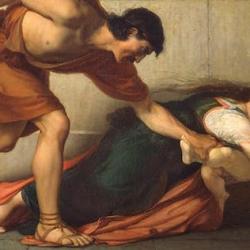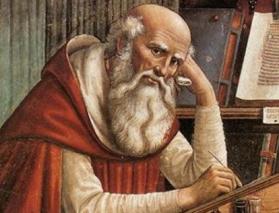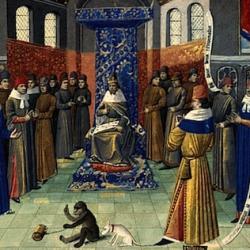Michael Bruno’s Political Augustinianism is a thorough examination of recent interpretations of Augustine’s political thought, starting with French scholars like H.I. Marrou and H. X. Arquillière, whose 1933 L’Augustinianisme Politique set the terms for much subsequent discussion, through the realist uses of Augustine in Niebuhr and the “secularist” interpretation of RA Markus, on to contemporary interpreters like Robert Dodaro, Eric Gregory, John Milbank, Rowan Williams, and Oliver O’Donovan.
Bruno highlights a number of recurring issues: The continuity or discontinuity between Augustine and his medieval interpreters; his “realistic” or “pessimistic” tendencies; Augustine’s understanding of saeculum and what moderns think of as secular society; the meaning of “two cities” in Augustine; Augustine’s thought on the role of the church in society and the relation of church and state.
To oversimplify, the poles of the discussion are best represented by Arquilliere and Markus. The former sees Augustine as providing the resources for medieval Christendom in which the natural order is absorbed into the supernatural. Bruno writes, “Arquillière believed, in Augustine that led to the absorption of natural law into the realm of supernatural justice, ‘the right of the State into that of the Church.’” Gregory the Great and even Hildebrand are natural products of Augustinian political thought. In this interpretation, Augustine sees Christianity as a transformative political force that produces something like a theocratic order.
Markus argues the opposite: Augustine was the precursor to liberal pluralism, in that he understood the “secular” as a time shared by believer and unbeliever. Augustine thus offers “a positive valuation of the secular realm and its independence from religion is deeply rooted in the Christian tradition, especially as formulated by Augustine of Hippo, and that it is rooted in the New Testament.” As Markus puts it, “So conceived, the Church makes no claim to dominating or exerting power over civil society; indeed it can repudiate such claims as incompatible with the nature of its relationship to earthly powers. The Gospel is to be mediated through preaching its message and sustained public debate, without threatening the autonomy of the secular order.”
These stark differences of interpretation suggest the likelihood that Augustine is up to something else. Among the most astute interpreters in recent years has been Robert Dodaro, who argues in his Christ and the Just Society in the Thought of Augustine that Arquilliere was asking the wrong questions. As Dodaro puts it, “In my view, Arquillière asked the wrong question of Augustine’s texts. Stemming as it did from the equally maladroit fixation by Mandonnet and Gilson on what they claimed was a lack in Augustine’s thought of a formal distinction between the natural and supernatural realms . . . Augustine, in my view, is far less interested than his interpreters in discussing the respective merits of a Christian or secular state.”
On the other hand, Dodaro disagrees with the “pessimistic” and secular interpretation of Augustine insofar as Augustine recognizes the transformative effect of the theological virtues on political life. Though Augustine recognizes the temptations that power presents, he does not beleive the saeculum is impervious to the effect of grace. As Dodaro puts it, “Christians in public life can develop the capacity for moral reasoning, aided by grace, in which their practice of civic virtues is transformed by their practice of Christian faith, hope, and love.”
And more fully: “For Augustine, faith, hope, and charity are alone capable of drawing the Christian statesman beyond the limited, temporal perspectives of the earthly city into a deeper love of God, and therefore into the eternal reality of the heavenly city. Augustine believes that the theological virtues accomplish the because they alter the way the statesman understands and practices the political virtues in the performance of his public duties. When Augustine congratulates Macedonius for governing in the earthly city ‘with his mind fixed on the heavenly city,’ he is acknowledging the effects of these three virtues on the imperial vicar . . . the theological virtues alter the Christian statesman’s practice of the political virtues.”
Augustine’s political thought is no relic of history. Bruno analyzes John Ratzinger’s uses of Augustine in addressing contemporary political issues, and Radical Orthodoxy has proposed Augustine as an important guide out the impasse of secular reason and politics. These notes do no more than scratch the surface of the rich, complex, and important debate that Bruno overviews so expertly. For those looking to enter the debates over political Augustinianism, this is an excellent place to begin.















